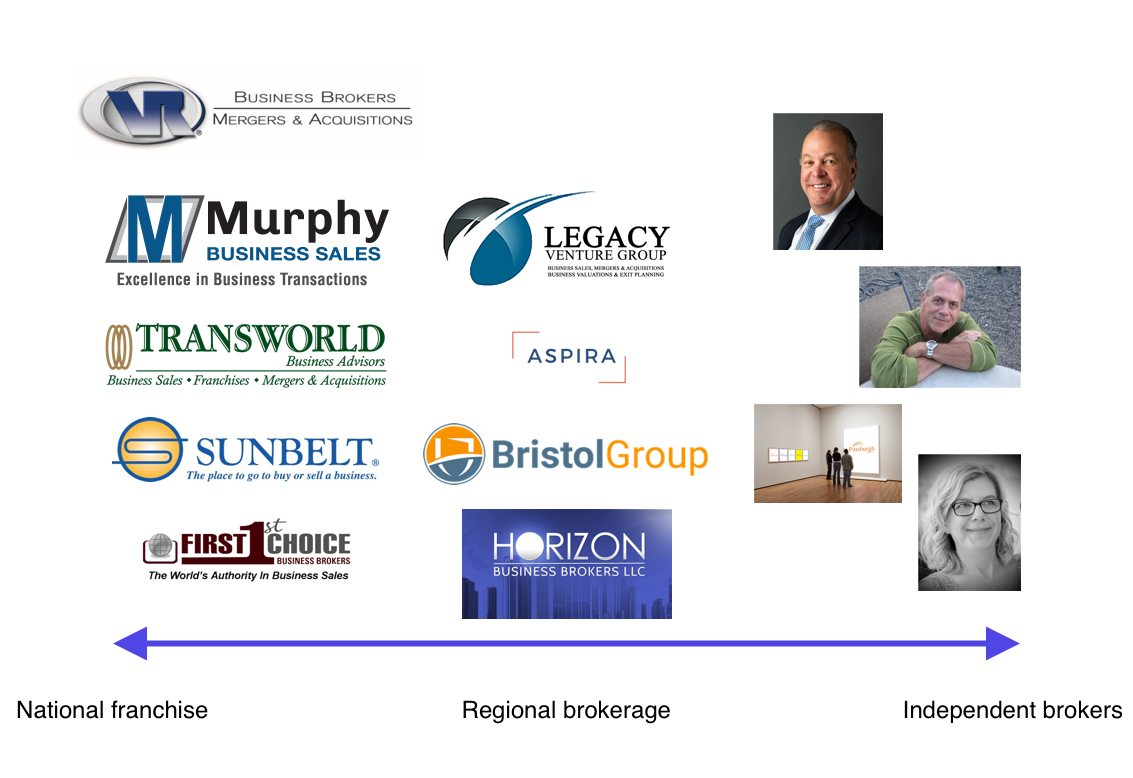Not quite ready to sell?
Subscribe to receive the latest resources for small business owners.
Business brokers have formed a crucial part of the SMB ecosystem for decades. They’ve served the role of educator, negotiator, and shepherd to hundreds of thousands of business sellers and buyers.
While some may give the industry a bad reputation, most are driven by the urge to help small businesses thrive and have carved out a niche for themselves in the broader business broker industry. It’s important to understand what these niches can look like in order to make an informed decision on what type of broker is the best fit for your needs.
The most common brokerage arrangements are national franchises, regional brokerage firms and independent brokers working alone.

Business Broker Franchises
Although there are around 10,000 business brokers, there are around 3,000 business brokerages. Most brokers belong to either a franchise or a regional firm.
The franchise firms have strong branding, resources, and processes, which makes them attractive to people entering the business brokerage industry. Generally, business brokers working for a franchise will have paid an initiation fee, undergone corporate training at a central site, and agreed to uphold the processes and values of the firm. They attend regular training and pay a monthly technology / back-office fee as well as a franchise fee, which is often structured as a small share of their top-line revenue.
Some of the most well-known franchises include Transworld Business Advisors with over 150 office locations, Sunbelt Business Brokers with over 120 offices in the states and some internationally, Murphy Business Sales with around 125 locations, and First Choice Business Brokers with franchises in 30 locations and counting.
Franchises are a great option for many business owners. They generally have a wide mandate and can adequately serve most main street businesses and even businesses that start to hit the lower-middle market threshold ($2-3M in revenue/yr). The upside to working with a franchisee is that you can rest assured that they have been trained and know what they're doing.
The downside to working with a franchise is that they may have more stringent criteria to the types of sellers they will work with and what their fee arrangement is. Moreover, for certain businesses such as dental or medical practices, they may not have the expertise or network that you need.
Regional Brokerage Firms
Outside of the dozen or so national franchises, the rest of the business brokerage establishments are regional firms. They'll employ a few brokers as well as some back office staff.
These firms generally have a strong rolodex in their respective regions. This includes local legal counsel, accountants, commercial lenders, and CFAs. The lead brokers of this firm are often quite knowledgeable and have been in the industry for quite some time. Otherwise, they would not have been able to recruit additional brokers and support staff such as marketers, IT staff and secretaries.
Working with a regional firm can be the best of both worlds, in terms of the support and flexibility. However, it's important for prospective clients to reference check the firm with past sellers and buyers who have worked with them in the past. Because these firms do not have centralized training and processes, you'll want to make sure that they were able to devote the adequate time and resources to previous clients.
One advantage that such firms can bring to the table is industry expertise. Many brokerage firms may pick an area of expertise whether it's dental practices, medical practices, restaurants or car washes.
A potential downside to working with a regional firm is when you are not being handled directly by one of the lead brokers, but instead by an agent who lacks the standardized training present at a national franchise.
A few of the quality regional brokerages are Horizon Business Brokers, Bristol Group Business Brokers, and Aspira Brokers.
Independent Brokers
Lastly, there are independent brokers. These single-broker operations make up the long tail of the business broker landscape. Many of these brokers may have a background in commercial lending, real estate or larger corporate transactions.
These brokers are almost always quite local, focusing on a single state or region. They are able to be quite hands on with their clients and dedicate time towards finding the best buyer. Another benefit they bring is flexibility, given that they do not need to support a broader organization and have their own mandate. This can be reflected in fee arrangements, the ability to do exit planning or ongoing consulting, as well as accepting listings that may take longer to close.
While some independent brokers are simply amazing, it's important for business owners and buyers to do their own due diligence on potential broker partners. Given that the business brokerage industry is only licensed in around 17 states, the level of quality can vary quite a bit in the industry, specifically among independent brokers.
A few things to check on: what expertise the broker has, how many transactions they typically work on in a given year, what percentage end up selling, and how accurate their recommendations for selling prices are.
A follow-up post will dive into the highlights of what to look for in a business broker.
Not quite ready to transact?
Subscribe to receive the latest resources for small business deals.

Will founded Beacon with the mission to help the current generation of owners to retire while enabling the next to unleash their entrepreneurial spirit. He comes from a business background having graduated from the Wharton School with a B.S. in Economics.
Information posted on this page is not intended to be, and should not be construed as tax, legal, investment or accounting advice. You should consult your own tax, legal, investment and accounting advisors before engaging in any transaction.

Calder Capital

Sam Domino


